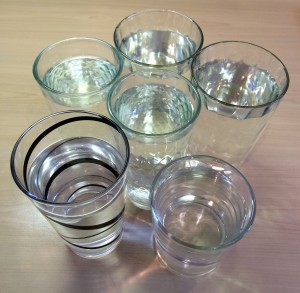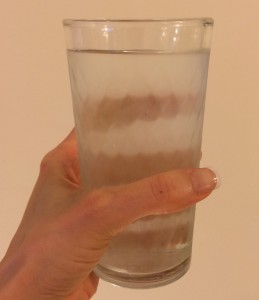We’ve all heard the healthy truism drink plenty of water. Good advice but it begs a few questions: how much is “plenty”? By “water” do we mean “fluids”? Can we drink too much? And why do it? Hopefully, this should make it all as clear as water.
First, the facts. Water is literally vital. It is arguably the most important of all human nutritional needs and makes up 60-70% of the body. Just 10% dehydration is fatal.
Water is the base fluid of blood, and transports everything, such as nutrients, oxygen, vitamins and minerals to where they are needed and takes waste products to the excretory organs. One charmless sign of dehydration is constipation.
Water is also the environment in which every single chemical reaction in the body takes place. The water content of each individual cell of the trillions we have needs to be kept constant so metabolism and all other functions like digestion remain efficient.
Water also regulates temperature, distributing heat from places like exercising muscles to cooler areas like the skin’s surface.
In addition, the body is continually losing water: around 1.2 litres in urine, 750ml within faeces, 400ml via sweating and 150ml through breathing all add up to an output of around 2.5 litres every day. And that’s without walking the dog.
Moreover, what goes in varies. Fruit and vegetables are very high in water, and a well-balanced diet could provide 1-1.5 litres. But a typical UK diet yields only about 0.3 litres. Water generated from metabolism contributes around another 0.3 litres.
That’s an output of about 2.5 litres and an input of around 0.6 litres. Therefore, to make up for the loss, the daily water consumption of a normal adult needs to be at least 1-2 litres per day.
This requirement increases with activity. An hour of exercise could result in 1-2 litres of water lost, depending on intensity and the weather. Very active people in hot, humid climates could need as much as five litres per day.
By far the best fluid to drink is water. Beware taking in fluids that actually encourage water loss. These are called diuretics and include drinks containing caffeine, such as coffee, tea and cola, as well as alcohol.
Caffeine stimulates the kidneys to excrete more water than usual, hence too much caffeine can lead to dehydration. Alcohol is also a diuretic. Many of the symptoms of a hangover are symptoms of dehydration.
Too much water is rare as the body excretes excess, and it’s better to consume little and often. Too little water is much more common, and the consequences can be serious, and frankly scary.
A loss of 3% of body fluids produces symptoms like a dry mouth, headache, nausea and lack of energy, while blood volume and flow reduces, as well as kidney function. A 5% loss results in heat exhaustion. At 7% dehydration, the individual will start to hallucinate. At 10%, it will lead to heat stroke, circulatory collapse and death.
Unfortunately, thirst is not a good indicator of water levels. The body cannot predict what will happen to its water content in the immediate future. So, by the time you feel thirsty, you are already dehydrated. Also your thirst will probably feel satisfied long before you have fully rehydrated. Water takes time to reach where it is needed.
However, urine colour is a reliable indicator of hydration. Some food substances may change the colour temporarily. B vitamins make it bright yellow and beetroot turns it red. But, generally, the lighter and clearer the urine, the better hydrated the body.
Health guides say any colour between clear and pale yellow indicates you are properly hydrated, yellow means mildly dehydrated and dark yellow is dehydrated. Any pee with green, orange or brown overtones is severely dehydrated. Blood in the urine means a trip to the doctor as it could require medical treatment.
In the meantime, bottle up! Carry a small water bottle everywhere and top up on the go, or have a jug of water and glass on your desk. At night, have a glass of water by the bed. And, first thing in the morning, drink a glass of water to flush out your system.
After initially kick-starting your kidneys and going to the loo a lot, your body will get used to being properly hydrated, and you will spend less time looking at the back of the toilet door. The benefits also include more energy, great skin, better digestion and fewer illnesses. And it’s free.
The water of life. What a bargain.



Comments are closed.